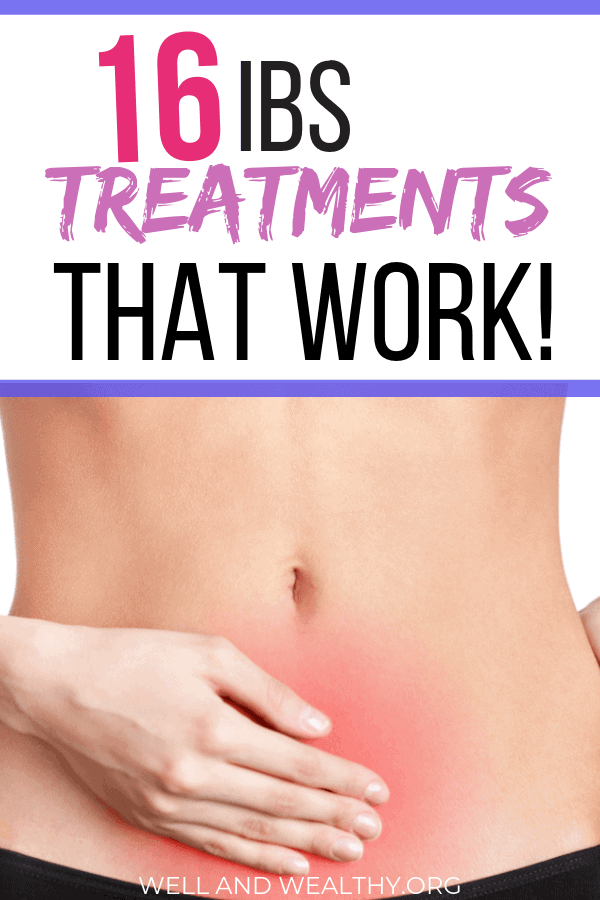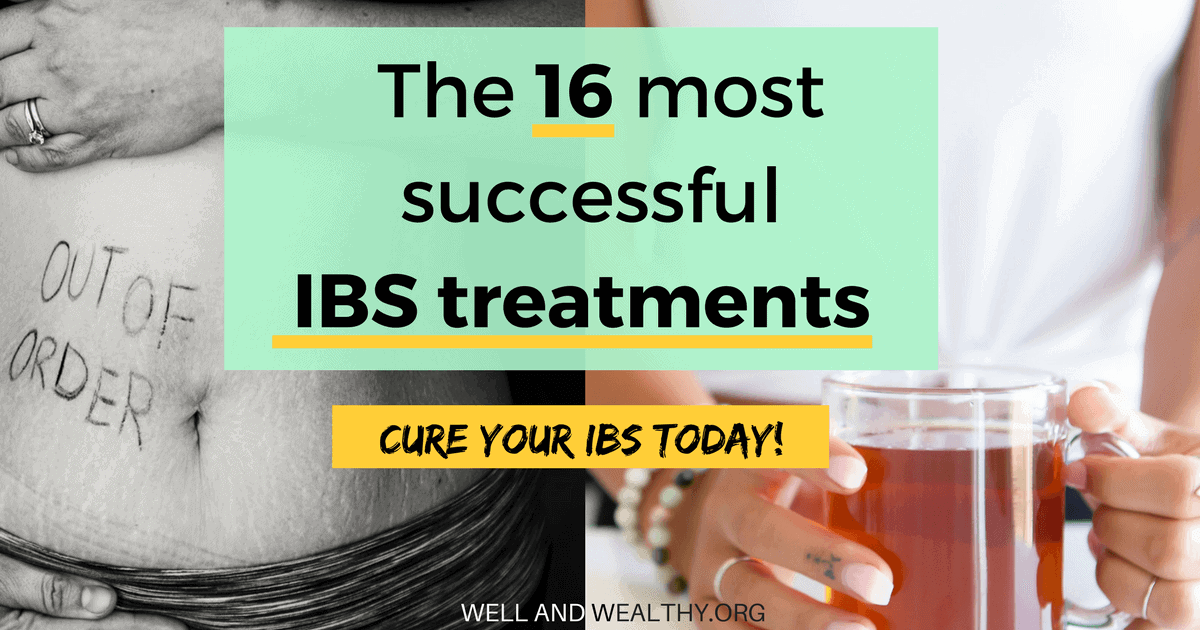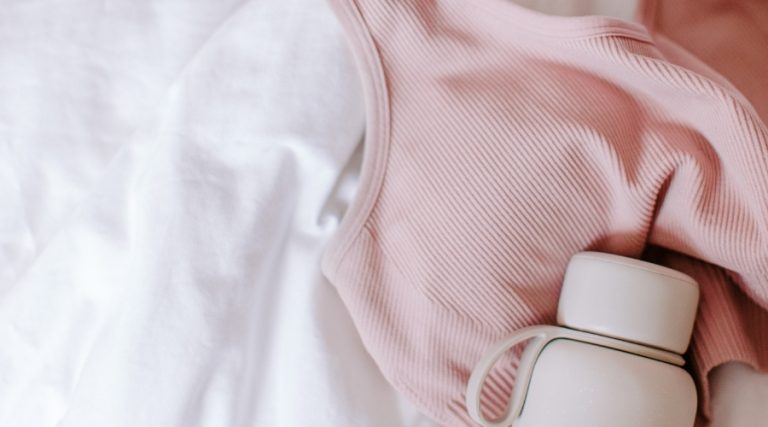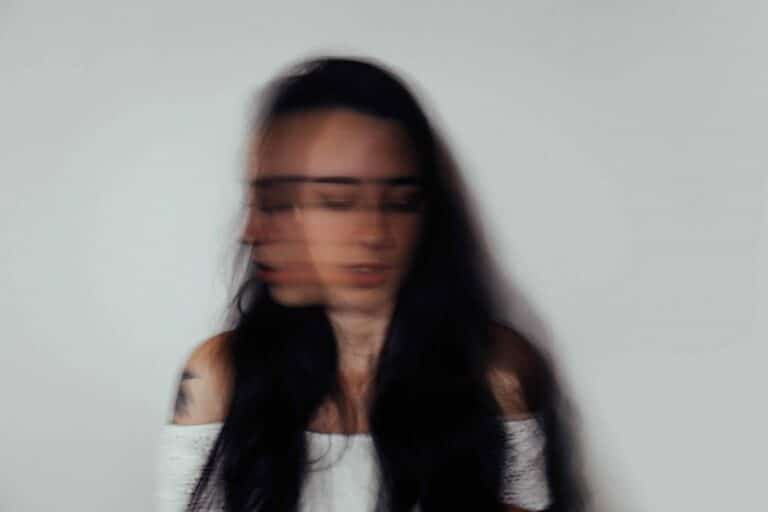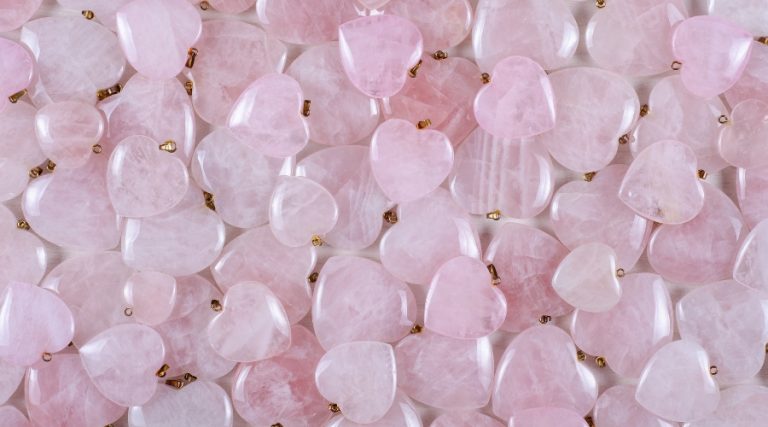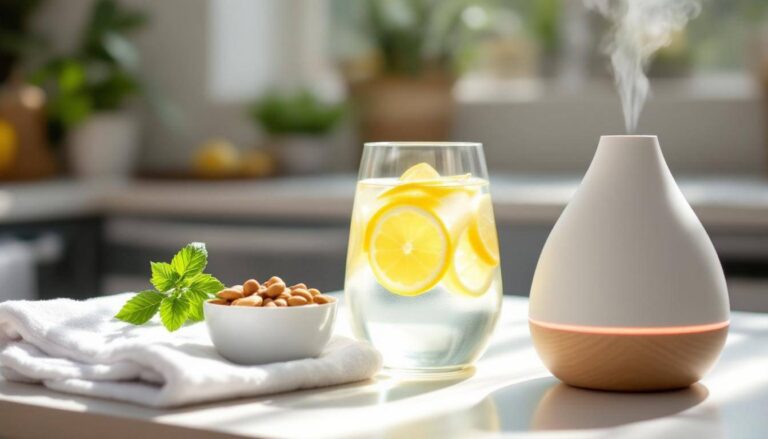16 Most Successful IBS Treatments, Natural Remedies
I’ve had IBS for over five years now and during that time I have learned way too much about the most successful irritable bowel syndrome treatments.
So I thought I would share this knowledge with you and I can guarantee you won’t have heard of everything on this list!
This post will mainly be about IBS-D (the diarrhea side of IBS rather than IBS-C, constipation) purely because that’s what I know about.
However if you do have IBS-C then it might still be worth having a look over this list because the root causes for both IBS-D and IBS-C can be quite similar.
As always, please seek medical advice from your doctor because this post is in no way a substitute!
I also won’t be going into lots of detail; it’s more like a master list of things that could help (or even cure, stay optimistic people) your IBS.
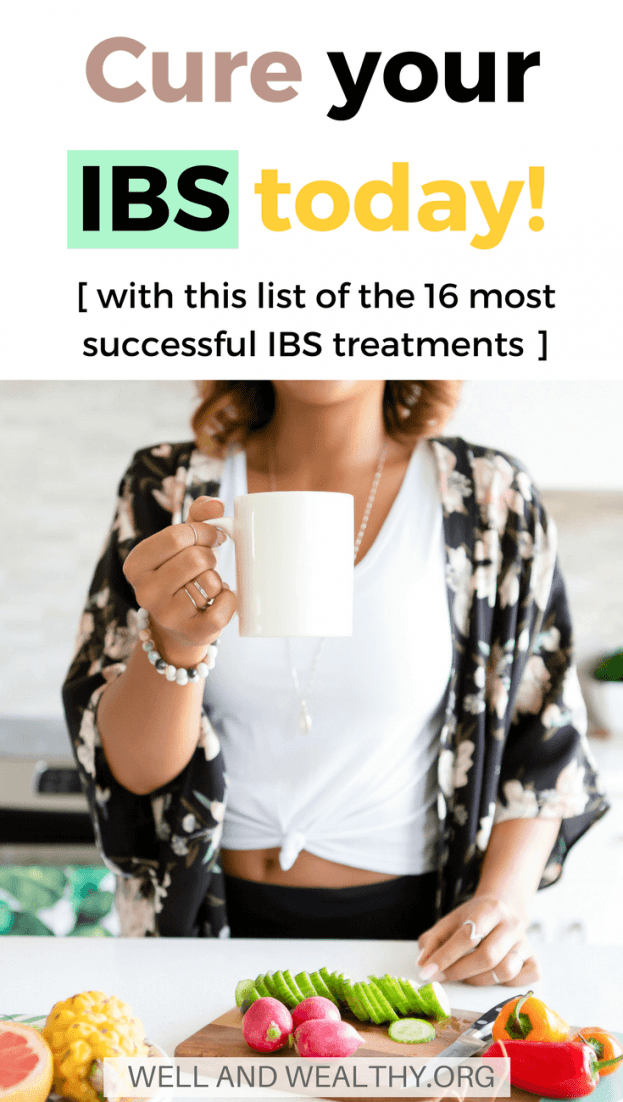
WHAT IS IBS?
The Mayo Clinic describes IBS as, “a common disorder that affects the large intestine. Signs and symptoms include cramping, abdominal pain, bloating, gas, and diarrhea or constipation, or both.”
And yes while that IBS definition is completely true I don’t feel that it accurately describes the effect of IBS on individual’s lives and how much of a negative impact it can have.
From my own experience, irritable bowel syndrome symptoms can literally rule your life and impact every day-to-day activity you wish to do.
The medical profession’s current stance is that there is no cure and they don’t really know what causes it.
Personally, I won’t accept that IBS is something I will have to deal with for the rest of my life, so I have made it my current mission to figure out my cure!
Yep, I said it…CURE!
The thing is that IBS can be triggered by so many different things (think leaky gut, anxiety, gut bacteria, food intolerances, candida, and the list goes on) that you do really have to experiment and test many different things to find what works for your body.
For example, some people swear that going on a strict plant-based diet is the cure for IBS, but I can certainly say that the more veg I eat, the worse my IBS gets. So right now that is not the cure for me, but it might be the cure for you…
Hence why I decided to write this master list of all the popular and successful IBS treatments, so you can work through the list and hopefully you will hit on YOUR cure.
That’s the dream right?
IBS MEDICATION
1) FOR A QUICK FIX YOU CAN GET IBS MEDICATION OVER THE COUNTER.
Okay it isn’t actually IBS medication in that it won’t ‘cure’ your IBS. But it will put a hold on your symptoms for a few hours or days and sometimes you just need to get through a special event or something important without IBS getting in the way.
I use Imodium Relief, which stops my diarrhea but also helps with all the gas and bloating that normally happens if I take an anti-diarrhea tablet.
I’ve tried cheaper options but they either give me awful stomach cramps and gas, or they just don’t work, so for now Imodium Relief is what I use when I have to.
SUPPLEMENTS AND NATURAL REMEDIES FOR IBS:
2) PROBIOTICS
If you have had IBS for more than a few months then you will have probably heard about the importance of probiotics.
Basically your gut is full of bacteria whose job it is to break down and digestive your food. When you have IBS chances are your gut bacteria are either depleted or the ratio of good to bad bacteria is wayyyy out of whack.
If you want to learn more about gut health then you should check out the Gut Health Super Bundle.
I take Natures Aid Pro-30 Max probiotics because they have 8 different strains of bacteria, 30 billion live cultures, you don’t need to keep them refrigerated and they aren’t too expensive.
3) FERMENTED FOODS
Staying in the probiotic, gut bacteria arena, fermented food is another way of getting good bacteria into your body.
Yogurt is a fermented food (but make sure you only eat natural yogurt with no added sugar), as is kombucha, kefir, sauerkraut, and kimchi.
I make my own kefir, which is delicious and super easy (check out the video below!)
You do need to buy some kefir grains (which you can get from Amazon!) but everything else (sugar, a jar…) you will likely have in your kitchen already.
It’s super yummy. Just don’t drink too much at once as it can be quite powerful, build up your tolerance.
4) DIGESTIVE ENZYMES
Some people find digestive enzymes really help their IBS. I’m still on the fence as I don’t think they help me much, but that doesn’t mean they aren’t your cure!
If you’re interested these are the digestive enzymes I take if I’m going to take any.
5) L-GLUTAMINE
L-glutamine is a super powerful supplement for IBS sufferers because it helps to repair a leaky gut (gut permeability).
For more gut health education check out the Gut Health Super Bundle.
I take 10g of l-glutamine daily, dissolved in a cup of water on an empty stomach. The great thing about l-glutamine is that’s it’s been used in bodybuilding for years to help workout recovery so you can buy loads at a really good price like this.
6) BONE BROTH
Sticking with the healing your leaky gut/ gut permeability theme, it’s time to talk bone broth. Not only is bone broth chock full of l-glutamine but it also contains a large amount of gut-healing components such as collagen. However, it’s not vegan, vegetarian or cruelty-free.
7) PEPPERMINT
Peppermint tea and peppermint essential oil is very well known to calm down the digestive system. I find that if I drink it after a heavy meal it can really help in stopping bloating and feeling sick.
You could grow your own peppermint plant, or just buy some peppermint tea and enjoy.
8) SLIPPERY ELM
Another digestive relaxant you could try is Slippery Elm. I have used it and can’t say I noticed a huge difference, but other people find it seriously helpful.
Apparently, it can help both constipation and diarrhea, so it could be really helpful if you alternate between IBS-D and IBS-C.
Slippery Elm is easy to buy, another IBS supplement you can pick up on Amazon!
9) MEDITATION/ YOGA/ MINDFULNESS (BASICALLY DE-STRESSING ACTIVITIES)
So many people find that stress and anxiety is a trigger for their IBS symptoms to flare up (myself included) and therefore find a lot of relief in de-stressing activities.
Personally, I just cannot meditate so I’ve come up with a whole list of de-stressing activities you could try:
- Meditation
- Mindfulness
- Yoga
- Qi Gong
- Tai Chi
- Having a massage (I like this one a lot!)
- Journaling
- Floatation therapy
- Hypnotherapy (hypnotherapy can really help with anxiety)
- ASMR (Auto-Sensory Meridian Response)
10) HYPNOTHERAPY
I know I mentioned hypnotherapy above as a way to reduce anxiety, which in turn would reduce your IBS. But hypnotherapy can also be used to treat IBS directly.
IBS DIETS AND NUTRITION:
11) IBS TRIGGER FOODS TO AVOID
There are a few common foods and drinks that can commonly affect IBS.
Before you start on one of the specialized IBS diets I’ve listed further down the page (they have great success, but they can be difficult to follow), it’s probably worth cutting out each of the common triggers below in case it’s just one of them causing your gut problems.
- Wheat/ Gluten (and even all grains)
Even if you are not celiac, wheat, or most likely the gluten protein inside wheat, could be causing your IBS. In fact many with IBS find that grains full stop trigger their IBS. (A great book about whether we should be eating wheat, grains or even carbs is Grain Brain by David Pearlmutter MD, and his other book Brain Maker is all about gut health. Very interesting for us IBS sufferers.)
- Dairy
Dairy intolerance is a classic cause of IBS symptoms and you should definitely try cutting it out for a few weeks to see it helps. But be warned, it might not just be the lactose that’s the issue, certain proteins in dairy products can also cause gut health!
Check out these amazing gluten-free and vegan recipes:
- Sugar
Unless you’ve been living under a rock you’ve probably heard that sugar is public enemy number one nowadays and sadly I would have to agree. Sugar can really help the bad bacteria or yeasts such as candida to grow in big numbers so be wary of the white stuff!
- Caffeine
Basically in the same way that caffeine wakes you up in the morning and makes you that bit quicker and reactive, well it does the same to your gut.
So if you already have a sensitive or overactive digestive system (which we IBS-D people most definitely do) caffeine is only going to enhance it, meaning you will speed up your digestion. Not what we are looking for!
- Alcohol
Just like with caffeine, alcohol will stimulate your gut and speed up digestion. I know a glass of wine is the perfect way to end the week (or day, no judgment here) but if you want to tackle your IBS you may have to give it up for a while. You never know, you might be one of the lucky ones who it doesn’t affect!
It’s worth noting that you might only have a problem with one of these common triggers, or you might have a problem with all of them (sorry). In fact if you’ve had IBS for a while there is a good chance you’re not able to digest any of those five things and more very well at all.
If that’s the case then you would probably be best to try out a specialized IBS treatment diet. I’ve listed the most popular and successful below!
IBS TREATMENT DIETS
12) LOW-FODMAP DIET
The low-FODMAP diet has a crazy high success rate at relieving IBS symptoms (it’s something like 75% of IBS sufferers find relief in this diet!!!) It’s all about reducing the intake of certain carbohydrates that are difficult for the body to digest.
Honestly, if you are going to give any diet a go then it should be this one because it has the most scientific proof behind it!
For more information, I would advise you go straight to the source and get the book written by Sue Sheperd The Complete Low-FODMAP Diet: A Revolutionary Plan for Managing IBS and Other Digestive Disorders.
13) GAPS DIET
The GAPS diet was developed by Dr Natasha Campbell-McBride after realizing the huge link between learning difficulties, mental health, nutrition and gut health.
Some people have incredible results; I haven’t tried the GAPS diet yet but I have read the book and Dr. Campbell-McBride knows her stuff. Full warning it is restrictive, which is why I haven’t attempted it yet, but does seem to work!
You can check out the GAPS book here: Gut and Psychology Syndrome: Natural Treatment for Autism, Dyspraxia, A.D.D., Dyslexia, A.D.H.D., Depression, Schizophrenia.
14) SPECIFIC CARBOHYDRATE DIET
Somewhat similar to the low-FODMPAP diet, the specific carbohydrate diet aims to restore gut health by reducing certain carbohydrates that cause fermentation in the gut.
There is a fair amount of research to back this diet up so it’s definitely worth a try! You can have a look at the book written by the biochemist and founder of the diet Dr. Elaine Gottschall Breaking the Vicious Cycle: Intestinal Health Through Diet.
15) LOW FAT OR HIGH FAT/ KETO DIET
Some people with IBS find they are overly sensitive to fat, so finding a low fat diet really helps. On the other hand, a lot of IBS sufferers find a high-fat diet (otherwise known as a ketogenic diet) works better for their digestive system.
Experiment and see, if you eat a lot of healthy fat (like avocado, oily fish, olive oil, coconut oil, etc) does your IBS get better or worse?
16) LOW FIBER OR HIGH FIBER
You won’t be surprised to hear that the amount of fiber eaten can affect your digestion. But considering how much we link fiber to regular digestion, fiber is rarely focused on in the IBS fight.
So it’s worth experimenting whether your digestion likes or doesn’t like a lot of fiber. Plus the type of fiber (soluble or insoluble) can make a big difference as well so experiment further.
Maybe it seemed that your body wasn’t very happy with you eating plenty of fiber, but it might only be insoluble fiber your body isn’t keen on! So make sure you do plenty of experiments.
I’ve found that all fiber is what triggers my IBS worst of all! No fiber for me!
You NEED To Try These 16 IBS Treatments – Conclusion
Phew, you made it to the end of this IBS treatment master list!
From all my research these are the most popular and successful treatments out there.
But don’t despair if you’ve tried all of these, there are even more IBS treatments to try, they are just a little less well-known!
